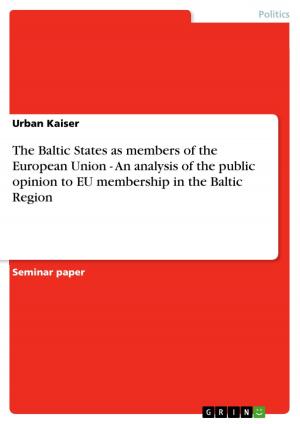| Author: | Kevin Rudolph | ISBN: | 9783656976103 |
| Publisher: | GRIN Publishing | Publication: | June 10, 2015 |
| Imprint: | GRIN Publishing | Language: | English |
| Author: | Kevin Rudolph |
| ISBN: | 9783656976103 |
| Publisher: | GRIN Publishing |
| Publication: | June 10, 2015 |
| Imprint: | GRIN Publishing |
| Language: | English |
Research Paper (undergraduate) from the year 2015 in the subject Computer Science - Applied, grade: 1,0, Technical University of Berlin, course: AIM1: Advanced Information Management I Heterogeneous and Distributed Information Systems, language: English, abstract: Most of today's information systems are highly heterogeneous and complex. High efforts and costs are put into interlinking systems to let systems communicate to each other and thus overcoming heterogeneity. The semantic web plays a significant role in the way it covers and links knowledge, making the web's content understandable for machine-to-machine interactions. Hereby, ontologies serve as a technology to cover, infer and verify knowledge and making it available to accomplish a common understanding among participating agents. This paper describes how ontologies are used in practice to support the overcoming of heterogeneity in information systems. After a revision of basic semantic technologies and standards like OWL and SPARQL we discuss a variety of methods and tools of the semantic web. In more detail, we investigate ontology editors, especially the Protégé tool as a well-established open-source application to create, edit and share ontologies. At last, we discover a variety of practical applications where ontologies are of high use.
Research Paper (undergraduate) from the year 2015 in the subject Computer Science - Applied, grade: 1,0, Technical University of Berlin, course: AIM1: Advanced Information Management I Heterogeneous and Distributed Information Systems, language: English, abstract: Most of today's information systems are highly heterogeneous and complex. High efforts and costs are put into interlinking systems to let systems communicate to each other and thus overcoming heterogeneity. The semantic web plays a significant role in the way it covers and links knowledge, making the web's content understandable for machine-to-machine interactions. Hereby, ontologies serve as a technology to cover, infer and verify knowledge and making it available to accomplish a common understanding among participating agents. This paper describes how ontologies are used in practice to support the overcoming of heterogeneity in information systems. After a revision of basic semantic technologies and standards like OWL and SPARQL we discuss a variety of methods and tools of the semantic web. In more detail, we investigate ontology editors, especially the Protégé tool as a well-established open-source application to create, edit and share ontologies. At last, we discover a variety of practical applications where ontologies are of high use.















